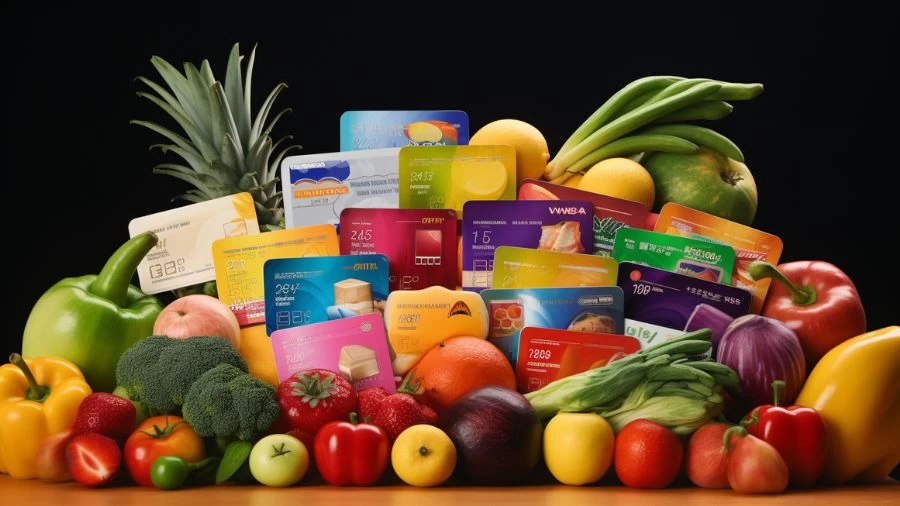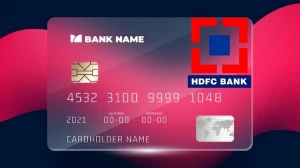
- Home »
- Credit Card »
- Best Credit Card for Groceries of November 2023
Best Credit Card for Groceries of November 2023
The top credit cards for groceries, include the Blue Cash Preferred, Citi Custom Cash, Target RedCard, Amazon Visa, American Express Gold, Citi Premier, Capital One SavorOne, and more.
by Kowsalya
Updated Nov 03, 2023
On This Page
- Best Credit Card for Groceries of November 2023
- What Are Grocery Store Cards?
- How to Pick a Credit Card for Groceries?
- What Are the Types of Grocery Store Credit Cards?
- Who Should Get a Grocery Store Credit Card?
- What is the Best Grocery Store Card With No Annual Fee?
- What Are the Pros and Cons of Grocery Credit Cards?
Best Credit Card for Groceries of November 2023
When it comes to finding the best credit card for groceries, several options are available to cater to different preferences and spending habits. These cards typically offer cashback rewards, bonus points, or discounts for grocery store purchases, making them a smart choice for those who spend a significant portion of their budget on groceries.
Factors to consider when choosing the best card include annual fees, rewards rates, welcome bonuses, and any additional perks such as travel benefits or dining rewards. By selecting the right credit card, you can maximize your savings and rewards while grocery shopping.
Here is the list of Best Credit Card for Groceries:
Blue Cash Preferred® Card from American Express
- Best Cash-Back Card for Groceries
- Credit Score: Excellent/Good (700 - 749)
- Annual Fee: $0 intro annual fee for the first year, then $95
- Welcome Bonus: Earn $250
This card offers up to a 6% reward rate on U.S. supermarket purchases, up to $6,000 per year (then 1%). It also provides cashback on streaming subscriptions and transit. The card has a $0 intro annual fee for the first year, then $95, and a welcome bonus of $250.
Citi Custom Cash® Card
- Best for No-Annual-Fee Grocery Rewards
- Credit Score: Excellent, Good, Fair
- Annual Fee: $0
- Welcome Bonus: $200
With the Citi Custom Cash Card, you can earn up to a 5% reward rate on eligible spending categories, including groceries. It has no annual fee, a $200 welcome bonus, and offers cashback on other spending categories.
Target RedCard™ Credit Card
- Best for One-Stop Shoppers
- Credit Score: Good/Excellent (700 - 749)
- Annual Fee: $0
- No welcome bonus
Target shoppers can benefit from a 5% discount on qualifying purchases made with this card. It has no annual fee, but it does not offer a welcome bonus.
Amazon Visa Credit Card
- Best for Whole Foods and Amazon Pantry Shoppers
- Credit Score: Good/Excellent (700 - 749)
- Annual Fee: $0
- Welcome Bonus: Amazon Gift Card
Ideal for Whole Foods and Amazon Pantry shoppers, this card offers 3% cashback on Amazon.com and Whole Foods Market purchases. It comes with a welcome bonus in the form of an Amazon Gift Card and has no annual fee.
American Express® Gold Card
- Best for Earning Membership Rewards on Groceries
- Credit Score: Excellent/Good (700 - 749)
- Annual Fee: $250
- Welcome Bonus: Earn 60,000 points
This card provides up to a 4X reward rate on dining and U.S. supermarket purchases. It has a $250 annual fee and a welcome bonus of 60,000 Membership Rewards® points.
Citi Premier® Card
- Best for Earning ThankYou Points on Groceries
- Credit Score: Excellent, Good (700 - 749)
- Annual Fee: $95
- Welcome Bonus: 60,000 points
Offering up to a 10X reward rate on various spending categories, including supermarkets, this card has a $95 annual fee and a welcome bonus of 60,000 points.
Capital One SavorOne Cash Rewards Credit Card
- Best No-Annual-Fee Card for Foodies
- Credit Score: Excellent, Good (700 - 749)
- Annual Fee: $0
- Welcome Bonus: $200
Foodies can enjoy unlimited 3% cashback on dining and grocery store purchases (excluding superstores). It has no annual fee and offers a $200 welcome bonus.
Bank of America® Customized Cash Rewards credit card
- Best for Less Common Bonus Categories
- Credit Score: Good, Excellent (700 - 749)
- Annual Fee: $0
- Welcome Bonus: $200
This card lets you choose your 3% cashback category, making it suitable for various spending preferences. It has no annual fee and a welcome bonus of $200.
Blue Cash Everyday® Card from American Express
- Best for Frequent Trips to the Store
- Credit Score: Excellent/Good (700 - 749)
- Annual Fee: $0
- Welcome Bonus: Earn $200
Similar to its sibling, the Blue Cash Everyday® Card offers cashback on supermarket purchases and has a $0 annual fee. It provides a $200 welcome bonus.
Savor Rewards Credit Card
- Best for Foodies
- Credit Score: Good/Excellent (700 - 749)
- Annual Fee: $95
- Welcome Bonus: $300 Cash Bonus
Foodies who dine out and enjoy entertainment can benefit from this card's rewards. It has a $95 annual fee and offers a $300 cash bonus.
What Are Grocery Store Cards?
Grocery store cards, also known as grocery rewards cards, are credit cards that offer cash back or points for purchases made at eligible grocery stores. These cards are designed to provide cardholders with rewards specifically for their grocery shopping expenses.
However, some of the best credit cards for groceries also extend rewards to other major spending categories, making them versatile options for everyday expenses. These additional spending categories may include dining, gas, transit, travel, select streaming services, online purchases, and even home improvement stores.
How to Pick a Credit Card for Groceries?
To choose a credit card for groceries, consider the following factors,
Shopping Habits
Determine where you shop the most. If you frequent various grocery stores and supermarkets, a general-purpose credit card with grocery rewards is a good choice. However, if you're loyal to a specific store or service, consider a co-branded or flat-rate rewards card.
Grocery Spending
Assess your grocery spending. If you spend moderately, a no-annual-fee card may be suitable. But if you spend heavily, a card with an annual fee may offer higher reward rates, potentially offsetting the fee.
Rewards Earning Style
Decide whether you want to maximize rewards with some effort or prefer simplicity. High-earning cards might require tracking spending categories, while flat-rate cards offer easier rewards accumulation.
Short- and Long-Term Benefits
Look for additional card benefits like sign-up bonuses, introductory APR offers, purchase protections, no foreign transaction fees, annual credits, or complimentary subscriptions. These perks can enhance the card's value.
Types of Shopper
Grocery rewards cards are versatile and beneficial for various shoppers, including budget shoppers, food enthusiasts, and those looking to build credit.
Join us at MarketsHost for a journey to financial expertise. Explore and reach new heights.
What Are the Types of Grocery Store Credit Cards?
There are three main types of grocery store credit cards,
Bonus Category Rewards Cards
These cards offer higher reward rates in select categories, typically ranging from 3 percent to 5 percent back in rewards. They earn cash back, points, or miles on purchases at stores classified as supermarkets based on their merchant category code. This includes popular grocery chains like Safeway, Albertsons, Kroger, Publix, and many local grocery stores.
Co-Branded Rewards Cards
Co-branded grocery rewards cards bear the name of a retailer and a credit card issuer. While you can use them wherever credit cards are accepted, they typically offer the best rewards when used at the retailer named on the card. These cards are especially useful when some stores that sell groceries aren't classified as grocery stores by credit card issuers.
Superstores like Walmart and wholesale clubs like Costco, Sam's Club, and BJ's are often excluded from earning grocery store bonus categories. Co-branded rewards cards allow you to earn elevated rewards at these chains instead of the lower rewards offered by traditional bonus category cards when shopping at these stores.
Store Credit Cards
Store credit cards, such as the Target RedCard™, are closed-loop cards, also known as private-label cards. They can only be used at a specific retail store. While these store-only cards may have higher APRs compared to other types of grocery store cards, they may be available to individuals with lower credit scores.
Additionally, these cards may offer deferred-interest financing options to help you pay off store purchases over time. However, it's important to pay off your balance before the promotional financing period ends to avoid potential financial difficulties.
Who Should Get a Grocery Store Credit Card?
Grocery rewards credit cards, known for their versatility and value, are well-suited for a wide range of individuals with grocery expenses. This includes college students, as well as both small and large households that frequently spend on groceries and gas. Let's take a closer look at two primary categories of shoppers who can gain significant benefits from these cards.
Budget Shoppers
- If you are constantly searching for deals, using coupons, and utilizing cashback apps when you shop, a grocery rewards card can be an excellent addition to your savings strategy.
- These cards allow you to earn rewards on your grocery purchases, which can help you keep more of your hard-earned money, making them a valuable tool for budget-conscious individuals.
Food Lovers
- Some grocery rewards cards also function as top credit cards for dining and restaurants. Whether you prefer cooking at home, dining out, or ordering food delivery, these cards can reward you for your everyday food spending.
- Food lovers can earn valuable cashback or rewards points on their food-related expenses, making these cards particularly appealing.
Credit Builders
- To qualify for most grocery rewards cards, you typically need to have good or excellent credit. However, individuals with fair credit who still want to earn cash back for their grocery purchases have options.
- Retailers like Amazon, Walmart, and Target offer credit cards that are more accessible to people with lower credit scores. These can be worthwhile as long as you can pay your balances in full and avoid the typically high-interest rates.
- Consider secured cards and general credit-building cards as well, as some private-label cards from specific stores may have high rates and fees, low credit limits, or restrictions on where they can be used.
What is the Best Grocery Store Card With No Annual Fee?
The best grocery store card with no annual fee depends on your shopping preferences. If you often shop at traditional supermarkets, the Blue Cash Everyday® Card from American Express is a great choice, offering cash back on grocery purchases.
For Whole Foods Market enthusiasts, the Prime Visa may be ideal, while the Costco Anywhere Visa® Card by Citi is a strong option for those who frequent warehouse clubs like Costco. These cards allow you to earn rewards without an annual fee, tailored to your specific grocery shopping habits.
What Are the Pros and Cons of Grocery Credit Cards?
Pros of Grocery Credit Cards
- Grocery credit cards allow you to earn rewards on all your purchases, helping you save money, especially in the face of inflation. This can be particularly beneficial for individuals and families with substantial grocery expenses.
- Some grocery credit cards offer introductory APR (Annual Percentage Rate), allowing you to make interest-free payments on purchases and balance transfers for a specified period, usually 12 to 15 months. This can be advantageous if you need to carry a balance or consolidate debt.
- Many grocery credit cards come with sign-up bonuses, providing the opportunity to earn a significant one-time lump-sum bonus by meeting a spending requirement within the first few months of opening the account. This can be a quick way to accumulate extra rewards or cash.
- Grocery credit cards often extend the return policy offered by retailers. This means you may be eligible for a refund on purchases made with the card even if the retailer refuses to accept the return, providing added security for your purchases.
Cons of Grocery Credit Cards
- Some grocery credit cards have monthly, quarterly, or annual caps on the amount of rewards you can earn. This limitation can restrict your ability to maximize rewards if you are a high-spender.
- Certain grocery rewards cards may limit redemption options, allowing you to redeem rewards only for cash options like statement credits. If you prefer travel rewards or other redemption choices, these cards may not be the best fit for you.
- Grocery rewards cards often come with high variable APRs. If you carry a balance from month to month, the interest charges can quickly surpass the value of the rewards earned, potentially leading to financial challenges.
- To avoid interest charges, you need to pay your balance in full each month. Carelessness or financial constraints may lead to late payment fees, cash advance fees, or penalty APRs, increasing the overall cost of using the card.
Best Credit Card for Groceries of November 2023 - FAQs
1. What are the benefits of using a credit card for groceries?
Using a credit card for groceries can offer several benefits, including earning cashback, rewards points, or miles on your grocery purchases.
2. How do I choose the best credit card for groceries?
To choose the best credit card for groceries, consider factors like your spending habits, preferred rewards type (cashback, points, miles), annual fees, and any additional perks the card offers.
3. Are there credit cards specifically designed for groceries?
Yes, some credit cards are tailored for grocery spending. These cards typically offer higher rewards rates or bonus categories for purchases made at supermarkets or grocery stores.
4. Do credit cards for groceries have annual fees?
Some credit cards for groceries have annual fees, while others do not.
5. What are the drawbacks of using a credit card for groceries?
Using a credit card for groceries may have drawbacks, including the risk of overspending and accruing high interest charges if you carry a balance.




